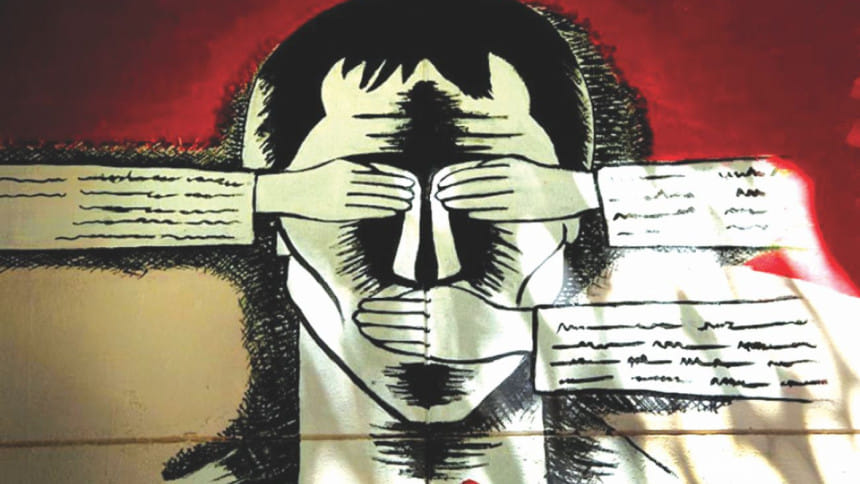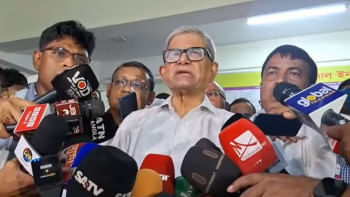Free the freedom

WHILE reading a book called 'Freedom is not free', by Shiv Khera, I find an undeniable truth that every generation needs to earn its own freedom. That means freedom is not free, in order to achieve freedom there should be some sacrifice. Even the historic four freedoms propounded by Franklin Roosevelt had arisen out of sacrifice of millions of people in the event of unprecedented danger and instability during the World War II. Coming to the birth of Bangladesh, it was the freedom for which three million people sacrificed their lives. But unfortunately, freedom is not free at all in Bangladesh even after forty three years of independence. Protection of freedom is constantly charging human lives amidst fear and instability. Now the question is how many more we have to sacrifice to secure freedom? A definite uncertainty might be the response.
The recent brutal killing of Avijit Roy, a writer and co- founder moderators of a popular blog Mukto-Mona (free thinker), reminds us again that the cost of freedom or free thinking can only be compensated by sacrificing human lives. This is not the only incident where freedom is compromised, rather it is becoming a common phenomenon in the present context of Bangladesh. According to the recently released human rights report of Amnesty International (AI) (2014/15), journalist, human rights defenders and bloggers were continued to be attacked and harassed during the year of 2014. It explicitly reported that “the government's use of Section 57 of the Information and Communication Technology (ICT) Act severely restricted the right to freedom of expression”.
The curtailment of freedom by virtue of legal instruments not only disregards constitutional commitment of freedom of expression but also jeopardises the rule of law which demands individual liberties.
It is true that freedom of expression guaranteed under Article 39 of the Constitution of Bangladesh is not absolute it also encompasses permissible restrictions but that does not in any way mean the curtailment of freedom without reasonable justification. In the case of Santokh Singh v Delhi Administration, AIR 1973, SC 1091, it was held that in determining the reasonableness of a restriction upon freedom of expression, a reasonable balance must be drawn between the need for the freedom in a democratic system of government provided by the constitution and the social interest in the prevention of disorder and anarchy.
In this regard, the extent to which people can exercise their freedom and the extent to which the state can impose restriction by virtue of saving clauses are yet to be ascertained in the context of Bangladesh. Since the voices of individuals are not empowered at all and on the other hand the voices of state mechanisms are more powerful, it is obvious that the vulnerability will be borne by people at large.
Freedom is regarded as an essential tool by virtue of which a citizen of a country can pursue legal avenue with a view to realising his or her entitlements. But amidst of lawlessness prevalent in Bangladesh accompanied by many enforced disappearance cases, number of extra-judicial killings, impunity of wrongdoers, it would not be an exaggeration to say that freedom of individuals are hindered by the hands of powerful state mechanisms and the availing of legal avenue by virtue of the tool of freedom remains a far cry.
The alleged misinterpretation of legislation by state machineries and the impunity of law enforcing agencies, as reported by Amnesty International (AI) facilitate the religious groups in Bangladesh to exploit the religious sentiments of common people and at the same time threaten the free thinkers. The AI report went on to state that “freedom of expression was also threatened by religious groups. In at least 10 instances, these groups were reported to have spread rumours that a certain individual had used social media to insult Islam, or had engaged in allegedly anti-Islamic activity in the workplace. At least five people were subsequently attacked; two were killed and others sustained serious injuries”.
These incidents not merely carry the story of brutal killings and sufferings but also reveal the dominant presence of anti-freedom elements even within the state machineries.
A culture devoid of freedom and freethinking cannot enlighten the torch of liberty rather it generates intolerance, disharmony and bigotry which lead to deviate from the core values of society.
Let me conclude with the words of Gilbert Francklyn that every deprivation of freedom is a species of servitude or slavery. Are we indulging in new form of slavery?
The writer is Lecturer, Faculty of Law, Eastern University.

 For all latest news, follow The Daily Star's Google News channel.
For all latest news, follow The Daily Star's Google News channel. 



Comments